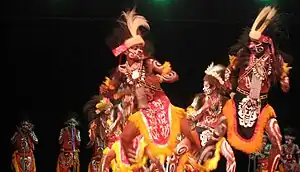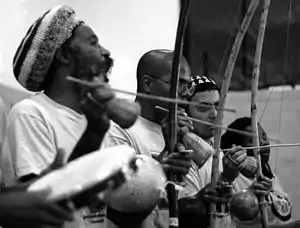War dance
A war dance is a dance involving mock combat, usually in reference to tribal warrior societies where such dances were performed as a ritual connected with endemic warfare. Martial arts in various cultures can be performed in dance-like settings for various reasons, such as for evoking ferocity in preparation for battle or showing off skill in a more stylized manner. It could also be for celebration of valor and conquest. Many such martial arts incorporate music, especially strong percussive rhythms.

War dances can overlap with sword dances and other forms of weapon dance, utilizing weapons or replications as part of the artistic performance.
War dances
Examples of war dances include:

Capoeira is a martial art traditionally performed with a dance-like flavor and to live musical accompaniment, as seen depicted here.
| Part of a series on |
| War |
|---|
- Aduk-Aduk – Brunei
- Ardah – Arabian Peninsula, Kuwait[1]
- Ayyalah – Arabian Peninsula
- Baris – Bali, Indonesia
- Bende War Dance – Nigeria
- Buza – Russia
- Blood walk – Bloods of United States
- Cakalele – Maluku, Indonesia
- Capoeira, as well as some similar Afro-Caribbean arts
- Cibi – Fiji
- Crip Walk – Crips of United States
- Dirk dance and Scottish sword dances – Scotland
- European sword dance or weapon dance of various kinds
- Haka - Māori people of New Zealand
- Hako (Rapa Nui) – Easter Island
- Hopak – Ukraine
- Hula & Kapu Kuialua – Native Hawaiians
- Indlamu – Zulu people
- Juego de maní – Cuba
- Kabasaran – Minahasan people, North Sulawesi, Indonesia
- Kailao – Wallis, adopted by Tonga
- Khattak – Afghanistan and Pakistan
- Khorumi (ხორუმი) – Georgia
- Ohafia War Dance – Eastern Nigeria
- Panther Dance – Burmese Bando with swords (dha)
- Pentozali – Crete
- Pyrrhichios – Greece
- Razfah – Oman and the United Arab Emirates
- Reggada – Morocco
- Sagayan – Philippines
- Siva Tau – Samoan war dance
- Tahtib – Egypt
- Takalo - Niue
- Yarkhushta (Յարխուշտա) – Armenia
- Yowlah – Oman and the United Arab Emirates
See also
References
- "Customs and Traditions in Kuwait". Retrieved 2013-05-03.
This article is issued from Wikipedia. The text is licensed under Creative Commons - Attribution - Sharealike. Additional terms may apply for the media files.